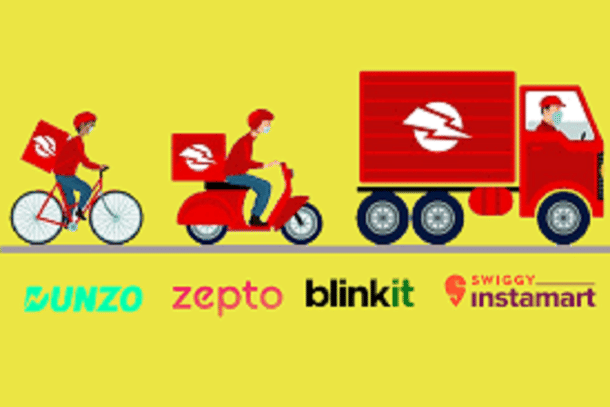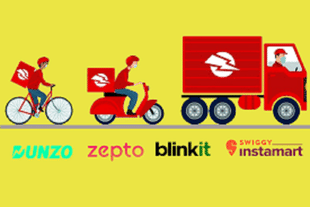News Brief
Explained: The Struggle And Slowdown Of Quick Commerce Space
Business Briefs
Feb 27, 2023, 11:00 AM | Updated 11:00 AM IST
Save & read from anywhere!
Bookmark stories for easy access on any device or the Swarajya app.


Amid the funding boom of 2021, the new fad among venture capitalists and entrepreneurs alike was quick commerce.
Zepto, the pioneer in the quick commerce space, promised a ten-minute delivery, a trend that large players quickly adopted in the delivery space.
Swiggy, Blinkit (previously Grofers), Reliance (through Dunzo and Jiomart Express), BigBasket and several others jumped on the bandwagon with their own quick commerce offerings.
Since money was no issue back then, these businesses scaled rapidly by establishing multiple warehouses (dark stores) to stock goods in high-demand urban areas and onboarding more delivery partners. However, with funding receding recently, these players have been forced to reconsider their options.
Players are Exiting the Business or Changing Strategies
With the focus on returning to profitability rather than burning cash to gain market share, these companies have been forced to change strategies.
Even during the first six months of 2022, the companies in this space managed to raise more than a billion dollars in funding. But, these companies realise the drawbacks of the business now.
Dunzo, for instance, is now pushing for 60-minute deliveries compared to the 15-minute deliveries it was focusing on earlier. It has also shut down some dark stores and is focusing on profitability rather than rapid geographical growth.
Dunzo’s shareholder Reliance Industries, had launched its own Jiomart Express for quick deliveries, but it has quickly shuttered the business due to the high cash burn it entails.
Ola Dash is another player that made a quick exit from the market. Others like Zepto, whose USP was the 10-minute delivery, now show delivery times of up to 20-25 minutes during surge periods, along with terms and conditions.
Why Quick Commerce is Struggling?
A longer delivery time allows the company to combine and deliver multiple orders with a single delivery partner. In contrast, a 10-minute order can only be completed with a single order in most cases.
The model also requires the dark store to be really close to the customer to prevent a delay, requiring multiple dark stores to be built so that the entire target market can be catered to easily – normal deliveries can be made with stores that are located away from customers.
In addition, these stores require a minimum number of orders to help them break even. Having dark stores that do not reach the minimum number of orders a day makes the business difficult to sustain.
According to reports, some quick commerce companies have been shuttering stores in sparsely populated locations for this reason alone. Others have explored options of setting up separate stores for slow-moving products to cater to a large area over a longer time frame.
The average order value in quick commerce is quite low compared to other e-commerce players since people are likely to order items for current needs through these platforms – rather than the entire month’s grocery at one go. As a result, ordering frequency is higher on these platforms, but the order value is lower compared to usual grocery e-commerce platforms. Hence, the average order value does not compensate the company for the costs it bears in procuring and delivering these items to customers.
Consolidation is the Only Likely Scenario to Emerge
Zepto, Swiggy Instamart, BB Now, and Blinkit are working on trying to get customers to buy more items on their platforms to increase order value. They employ incentives like free delivery above a certain amount, upfront discounts over a certain amount, increasing customer options and other means to increase order values.
For now, there are two outcomes – a move away from the promise of a “10-minute delivery” and incentivising customers to place large orders on these platforms. While these players don’t seem to be returning to the old one or two-day delivery formats, they certainly seem to be scaling back from the promises of 10-15 minute deliveries.
The space could be headed for consolidation since too many companies are operating in a market with a limited size. While some players like Jiomart Express and Ola Dash have completely exited the market, others might explore opportunities like mergers and acquisitions since high cash burn will likely continue.
Also Read: Is The Love-Affair With 10-15-20 Minute Hyperlocal Deliveries Coming To An End?





